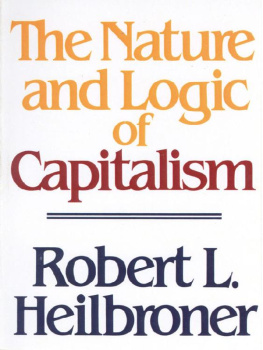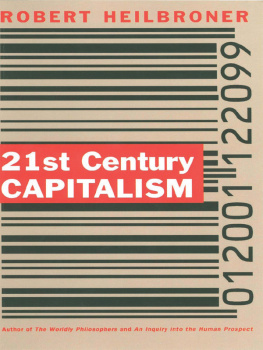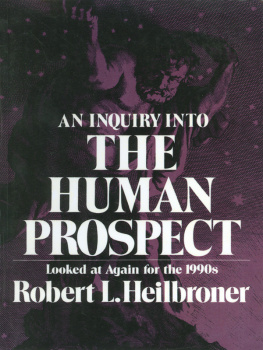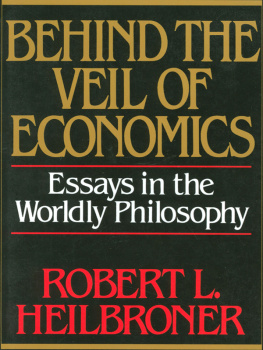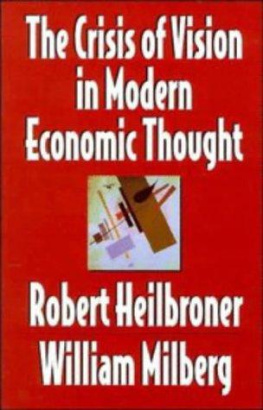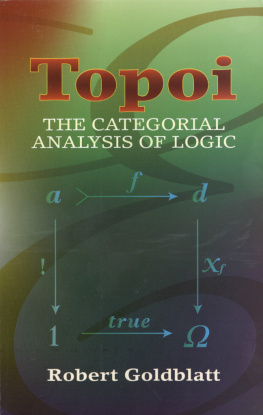Robert L. Heilbroner - The Nature and Logic of Capitalism
Here you can read online Robert L. Heilbroner - The Nature and Logic of Capitalism full text of the book (entire story) in english for free. Download pdf and epub, get meaning, cover and reviews about this ebook. year: 1985, publisher: W. W. Norton & Company, genre: Romance novel. Description of the work, (preface) as well as reviews are available. Best literature library LitArk.com created for fans of good reading and offers a wide selection of genres:
Romance novel
Science fiction
Adventure
Detective
Science
History
Home and family
Prose
Art
Politics
Computer
Non-fiction
Religion
Business
Children
Humor
Choose a favorite category and find really read worthwhile books. Enjoy immersion in the world of imagination, feel the emotions of the characters or learn something new for yourself, make an fascinating discovery.
- Book:The Nature and Logic of Capitalism
- Author:
- Publisher:W. W. Norton & Company
- Genre:
- Year:1985
- Rating:5 / 5
- Favourites:Add to favourites
- Your mark:
- 100
- 1
- 2
- 3
- 4
- 5
The Nature and Logic of Capitalism: summary, description and annotation
We offer to read an annotation, description, summary or preface (depends on what the author of the book "The Nature and Logic of Capitalism" wrote himself). If you haven't found the necessary information about the book — write in the comments, we will try to find it.
The Nature and Logic of Capitalism — read online for free the complete book (whole text) full work
Below is the text of the book, divided by pages. System saving the place of the last page read, allows you to conveniently read the book "The Nature and Logic of Capitalism" online for free, without having to search again every time where you left off. Put a bookmark, and you can go to the page where you finished reading at any time.
Font size:
Interval:
Bookmark:
BOOKS BY ROBERT HEILBRONER
Behind the Veil of Economics
The Essential Adam Smith
The Nature and Logic of Capitalism
The Debt and the Deficit
(with Peter Bernstein)
Economics Explained
(with Lester C. Thurow)
Marxism: For and Against
Beyond Boom and Crash
The Economic Transformation of America
(with Aaron Singer)
Business Civilization in Decline
An Inquiry into the Human Prospect
Between Capitalism and Socialism
The Economic Problem
(with James K. Galbraith)
The Limits of American Capitalism
A Primer on Government Spending
(with Peter L. Bernstein)
The Great Ascent
The Making of Economic Society
The Future as History
The Quest for Wealth
The Worldly Philosophers
21st Century Capitalism
Teachings from the Worldly Philosophy
Robert L. Heilbroner
The Nature and Logic of Capitalism

W W NORTON & COMPANY
NEW YORK LONDON
Contents
TWO MATTERS of some importance must be taken up before we can proceed to the substance of this inquiry into the nature and logic of the capitalist system. The first concerns the relation of the argument to that of Marx and the immense body of work that follows in his tradition. I dislike raising the question, but I do so for two reasons: first, because the answer will affect the response of many readers, positively or negatively, by virtue of the bright nimbus or the dark cloud that Marxism conjures up; and second, because the answer affects the level of exposition of the text.
Is this a Marxist view of capitalism? I am myself at a loss to give a clearcut answer to the question in view of the sprawling and disorganized state of what passes as a Marxist approach to social inquiry in general, or capitalism in particular. Much therefore depends on one's knowledge of that vast and ill-defined effort. For readers who will encounter for the first time the overall vision of capitalism that emerges in these pages, Marxs thought will no doubt appear as the single most pervasive and important influence. For others, more familiar with that thought and its elaboration within contemporary social science and history, what is apt to be noticeable are the distances and differences that separate my vision from that of much Marxian scholarship today and from Marx himself.
The issue of the degree of Marxian purity or the absence of Marxian taint is deplorable in any case. I raise the question because the assumptions and lexicon of Marxs work are still unfamiliar to much of the educated American public, as well as to considerable numbers of social scientists. I have therefore had to spell out a number of points that will be elementary for those at home in the world of Marxian scholarship but that are nonetheless elemental and essential for my argument. The converse of this is that the Marxian approach to a number of central matters is anything but settled, so that utilizing its concepts has on more than one occasion involved my taking sides in contested issues. To elaborate on these disputes, or to justify my own position with regard to them, would take me far afield of my purpose. I have decided to pursue my course as if it traversed neutral ground, but I must inform the neophyte and admit to the scholar that I know I am sometimes riding roughshod over uncertainly held terrain.
A second general issue concerns the level of scholarly detail and documentation appropriate for the book. I cover a wide range of material: classical, Marxian, and contemporary economics; anthropological investigations into early civilization; psychoanalytically based speculations with regard to human nature; various aspects of political and sociological theory; and of course a good deal of general and sometimes quite specific history. How much of this requires textual identification? I have come down on the side of spareness, citing specific quotations or important references but avoiding as much as possible long, discursive notes or a parade of well-known sources. I have, however, tried to identify contemporary works that have influenced me strongly, not only to pay my due respects but to forestall any appearance of posing as the author of ideas of which I am only an interpreter, or perhaps synthesizer.
It is as difficult for me to know how much of the book is new as to know how much is my own. Previous books of mine develop some parts of the argument that follows; other parts, and the overall architecture, are novel, or at least have never been put by me in quite this way before. The work as a whole moves at a stratospheric level of abstraction, very far removed from the rich microhistory that is the current vogue. How else could one hope to cover so vast a terrain? I have nonetheless tried to give the argument as much specificity as possible, without which it would not have the bite I intend for it. The book is, of course, written mainly in the context of the country in which I live, but the whole point of the study is to emphasize the second word in the phrase American capitalism. I have no expectations that this journey between heaven and earth will satisfy the dialectical angels looking down or the empirical earthlings looking up, and no delusions that the book will dispose of matters that have defied resolution to this date and are likely to continue to defy it for a long time to come. With all these acknowledgments and anticipated defeats, this is my effort to put paid to questions that demand some kind of settlement, even if necessarily on provisional account.
Finally, as part of the matter of settling accounts, I must give proper thanks to a few people who have provided assistance at various stages of this project, some with expert guidance, all with their moral support. I shall begin by paying homage to Adolph Lowe, in his tenth decade still my intellectual example, grand critic, and invaluable Beckmesser. Anwar Shaikh, my colleague at the New School for Social Research, has given me searching criticisms and indispensable encouragement, for which I am deeply grateful. I am indebted for readings of earlier drafts and for learned assistance to Peter L. Bernstein, Ronald Blackwell, Joseph F. X. Kaufman, Sir Henry Lintott, and Henri Zukier, and to Laurence Malone for helpful suggestions. I am also thankful for a Guggenheim Fellowship that greatly facilitated the completion of the work. And as so often before, Lillian Salzman gave her loving care to readying the manuscript.
I reserve the last words for my wife, whose belief, skepticism, criticism, praise, impatience, endurance, and great solicitude were necessary conditions for seeing the work through.
. In my Marxism: For and Against (New York: W. W. Norton, 1980) I discuss these distances and differences, as well as the underlying filiations.
A short bibliography at the end will indicate my main sources and references.
I HAVE CHOSEN a formal, even formidable, title for my book, and my first task is therefore to clarify what The Nature and Logic of Capitalism is about. Perhaps I can best do so by relating it to my previous work. For a long time I have conceived of my investigations into economics as the exploration of scenarios of development of capitalist economies. Scenario is a somewhat melodramatic, but I think apt, term, for it implies that the developmental sequences of capitalism depict narratives as well as impersonal processeshistorical dramas that emerge most strikingly from the pages of The Wealth of Nations and Capital but that are discoverable to some degree in the works of most of the great economists.
Thirty years ago I presented these scenarios as the projects of the worldly philosophers, and in later books I have used my own imagination to suggest likely trajectories of the system. Gradually, however, my focus of interest in economics has shifted. The evolution of capitalism continues to attract my attention, but I now see the object of my inquiries as directed at a larger questionnot:
Next pageFont size:
Interval:
Bookmark:
Similar books «The Nature and Logic of Capitalism»
Look at similar books to The Nature and Logic of Capitalism. We have selected literature similar in name and meaning in the hope of providing readers with more options to find new, interesting, not yet read works.
Discussion, reviews of the book The Nature and Logic of Capitalism and just readers' own opinions. Leave your comments, write what you think about the work, its meaning or the main characters. Specify what exactly you liked and what you didn't like, and why you think so.

